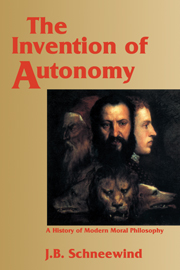Book contents
- Frontmatter
- Contents
- Preface
- Acknowledgments
- A note on references and abbreviations
- Introduction
- Part I The rise and fall of modern natural law
- Part II Perfectionism and rationality
- Part III Toward a world on its own
- Part IV Autonomy and divine order
- Epilogue
- 24 Pythagoras, Socrates, and Kant: Understanding the history of moral philosophy
- Bibliography
- Index of names
- Index of subjects
- Index of biblical citations
24 - Pythagoras, Socrates, and Kant: Understanding the history of moral philosophy
Published online by Cambridge University Press: 05 June 2012
- Frontmatter
- Contents
- Preface
- Acknowledgments
- A note on references and abbreviations
- Introduction
- Part I The rise and fall of modern natural law
- Part II Perfectionism and rationality
- Part III Toward a world on its own
- Part IV Autonomy and divine order
- Epilogue
- 24 Pythagoras, Socrates, and Kant: Understanding the history of moral philosophy
- Bibliography
- Index of names
- Index of subjects
- Index of biblical citations
Summary
“In moral philosophy we have come no further than the ancients.” So Kant told his students (9.32 and 28.540). He was not modest about his own achievements in the theory of knowledge. Why did he not claim that the critical understanding of morality was as revolutionary as its epistemological counterpart? He certainly thought about the issue. Unlike Aristotle, who summarized the opinions of his predecessors in metaphysics but not in ethics, Kant regularly taught his students something about the history of moral philosophy, and particularly about the ancients. He seems to have lectured less often on the history of other philosophical subjects, but he drafted an important prize essay assessing the progress recently made in metaphysics. Is it only because no academy had a competition on the subject that Kant wrote no comparable essay about progress in ethics?
To ask these questions is to ask about Kant's understanding of his own historicity as a moral philosopher. The question leads us to ask as well how Kant understood the point of philosophical ethics. In Chapter 22.ii I pointed to some indications that at a formative period Kant felt uneasy about the vocation of a philosopher. I also noted his rejection of the Wolffian belief in the social need for authoritative pronouncements about morality from scholars who spend their lives studying it.
- Type
- Chapter
- Information
- The Invention of AutonomyA History of Modern Moral Philosophy, pp. 533 - 554Publisher: Cambridge University PressPrint publication year: 1997



